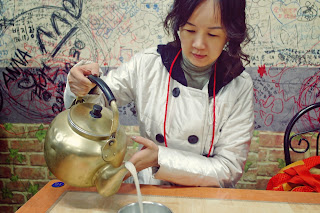Although makgeolli is available in Singapore, but the taste is different from freshly brewed makgeolli. It's because the exported versions have to be sterilised to stop the fermentation process. The bottled makgeolli sold here didn't have the natural carbonated fizzy which found in the latter stages of fermentation.


I like soju but my first choice or alcohol drink is makgeolli.
It's because I like the sweet flavor of makgeolli and the
alcohol content is lesser than soju, so I can drink more ;P
It's because according to the report, there are lots of anti-carcinogenic substances in the makgeolli. A bottle of makgeolli has 70-80 billion lactic-acid bacteria when a bottle contains around 700-800㎖ makgeolli. Probiotics or lactic-acid bacteria has a lot of benefit health, strengthen body immune system and help to destroy harmful germs and bacteria that cause inflammation or cancer in the intestine.
Jeonju is famous for its savoury food such as bibimbap, kongnamulgukbap and makgeolli. Yes, you read it right. Makgeolli is considered as food instead of drink in Jeonju.

Traditional Liquor Museum (전주 전통술박물관).
Traditional Liquor Museum is the place where the tradition of home-brewed liquor is alive. This unique museum has the exhibition hall, showing the process on how to make these traditional liquors.


This galery has models showing how the preparation, boiling,
distillation until it's ready for comsumption.

Comic-style of how to brew traditional wine.

Japanese Sake.

 Not sure what books are those as they're in Chinese characters.
Not sure what books are those as they're in Chinese characters.







History of Soju and explanation on how to make soju.

Wow! so many types of soju from different regions.

 Makgeolli, come to me oh my makgeolli!
Makgeolli, come to me oh my makgeolli!

 Wines... (Interesting article: Alcohol in Korean Life).
Wines... (Interesting article: Alcohol in Korean Life).

People love to drink on the platform (평상 = pyeong sang) outside the house.

Various types of yeast ingredients such as: millets, barley,
green beans, corn, wheat, rice,...



Noticed that a lot of street vendors selling Moju (전주 모주; 母酒).
Curious about this alcoholic drink so I googled to find out more about this drink. Moju is a local beverage
from Jeonju although not as famous as Jeonju Makgeolli. It's actually means, "liquor made by the mother of the queen
consort." This is according to the "Daedong Yaseung" (대동야승, 大東野乘), an
unofficial collection of histories, anecdotes and essays compiled during
the reign of King Injo (1595-1649). Based on the book, the mother of
Inmok Daebi (1584-1632), the queen consort, made handmade liquor by
reusing the rice alcoholic beverage grain from making makgeoli and sold
it to local residents at a cheap price when she was exiled to Jeju
Island.
Moju is made from mixing Makgeolli with a range of Oriental medicines ingredients including cinnamon, ginger, jujubes,
ginseng, kudzu, roots of arrowroot, and fruit, then boiled for about 24 hours, which causes most of the alcohol to
evaporate leaving about 1.5% of alcohol content. Thanks to the
medicinal ingredients, it is known as a healthy drink, helping to
prevent colds, especially in the winter. It goes well with any kind of
ordinary Korean meal, such as hot soups and rice. These days, Moju is
even used to create more varied food items, like ice cream. (Source: Korea.Net)

People love to drink on the platform (평상 = pyeong sang) outside the house.
Now, I think I know why Jeonju is famous for Kongnamul Gukbap (콩나물 국밥) too, because it's good for relieving hangover after drinking alcoholic drinks.

This wavy waterway pond is use to serve the wine.


In old days, seonbi will recite a poem when the cup filled with wine
is flowing in front of him. It's such an interesting game.

This decoration wooden fish looks like Mokeo (목어),
which usually found in Korean temples.



There are many programs with small participation fee such as: making
sweet rice
alcoholic beverage, Moju (crude liquor) filtering,
Hyangeumjurye (local
wine-drinking rituals). Please note that
reservation is needed in advance.

Add: 74, Hanji-gil, Wansan-gu, Jeonju-si
Phone: 063-287-6305
Website: http://urisul.net
Related Posts:

![Chez Maak (셰막) Makgeolli House - White Lotus Makgeolli [Seoul] Gangnam, Garosugil & Gwanghwamun | meheartsoul.blogspot.com](https://blogger.googleusercontent.com/img/b/R29vZ2xl/AVvXsEhZXnDuuQCKBsEona5pH2nBYgean7_G1bI4QqX890VSmeUJhfliEDlBs_FxXWvt9WA-R7nr8i3yCLpWvfc7ODs-eCZhoKkDPW0Y_nL7wdA3zUU2A96ItQ8qvmzVKtR6qxh_uzfs3h7ILRg/s320/20130911_185444.jpg)
![Please help me to transfer the main mash using this traditional bucket. www.meheartseoul.blogspot.sg | [Kobe] - Hakutsuru Sake Brewery Museum](https://blogger.googleusercontent.com/img/b/R29vZ2xl/AVvXsEgjzHvef-X0wjPoPhtLCypyY2i6hCkKC-hh2gja3XM77el6dVjEVnUkyILysZwNGs4yXQ5UzIvyf1tEzg7arpZ2Hja3KDLaPQNfnhMHbTN-g1HM5eMNTxdo1Wjv66jd_m3XdMKzbjD6my3O/s320/Kobe+-+Hakutsuru+Sake+Brewery+Museum+%25289%2529.jpg)

